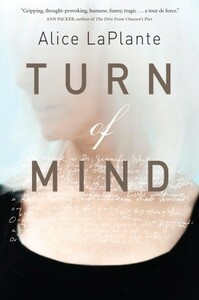Take a photo of a barcode or cover
This must have been an incredibly difficult book to write. We are seeing everything from the perspective of a doctor who is suffering from Alzheimer's. She is not always oriented to time and place, and does not always realize which people are with her. There are three main parts to the book: first, when she is living at home, second, when she has been moved to a rather nice assisted living facility, and third, when she escapes from that facility and wanders through the streets of Chicago.
There is a mystery at the heart of the book: the protagonist's friend has been killed, and the fingers of one of her hands have been surgically severed. Since our heroine was once a hand surgeon, the eyes of the police are on her. She doesn't believe she's committed a crime, but doesn't really know. We see all the suspects through her eyes: the son with money problems, the unstable daughter, the hired help. We glean nuggets of information and learn bits and pieces, but everything is fragmented and difficult to put together.
Despite this, the book flows smoothly. We can empathize with our heroine, even if we see that she wasn't always a perfect, or even particularly nice, person. You want to keep reading to find out more information. And the information is given out organically, meaningfully.
I don't know if I'd describe this as a literary mystery or not, but I've never read anything quite like it and I would recommend it without hesitation.
There is a mystery at the heart of the book: the protagonist's friend has been killed, and the fingers of one of her hands have been surgically severed. Since our heroine was once a hand surgeon, the eyes of the police are on her. She doesn't believe she's committed a crime, but doesn't really know. We see all the suspects through her eyes: the son with money problems, the unstable daughter, the hired help. We glean nuggets of information and learn bits and pieces, but everything is fragmented and difficult to put together.
Despite this, the book flows smoothly. We can empathize with our heroine, even if we see that she wasn't always a perfect, or even particularly nice, person. You want to keep reading to find out more information. And the information is given out organically, meaningfully.
I don't know if I'd describe this as a literary mystery or not, but I've never read anything quite like it and I would recommend it without hesitation.
It was an interesting point of view from which to tell the story. Amazing first novel. I recommend it.
LaPlante writes a three-in-one novel, which explains its intensity and complexity. It's a compelling detective story that seeks to identify who murdered and mutilated Amanda, a woman from a regentrified Chicago neighborhood. This is a story that could stand on its own as a riveting tale if written from the perspetive of law enforcement. LaPlante's novel is also a family drama, which has enough secrets, conflicts, mixed motives, self-destructive behaviors and emotion among the six main characters (a family of four and their neighbors, and a childless couple) to stand alone as a novel rich with insight about the human condition. It's also a psychological study about those who suffer the raveges of Alzheimer's Disorder (AD). In this case it's Jennifer--hand surgeon, mother to a son and a daughter, wife to an attorney, best friend to Amanda. Watching these six main characters and a live-in caretaker struggle with the many renegotiations required by AD creates enough conflict to sustain a novel all by itself.
As if weaving these three novels into one isn't enough, LaPlante boldly chooses the person with AD to serve as the narrator. I do like novels with a lot of layers, and this work certainly delivered--so much so that I woke up at 3:00 am to finish it because it occupied my psyche so completely.
I chose the novel because of my interest in dementia, particularly AD. However, I got something a little more than informative, something a bit darker than anticipated. Each character has his or her startling excesses. Watching the novel unfold the various collusions and clashes brought on by the characters' excesses was engaging if not at times painful to watch. By the end, I was reminded of Ibsen's Wild Duck and Williams' Streetcar Named Desire, plays that suggest that some things are best not remembered because when they are brought out to light, great violence of emotion and behavior may occur.
As if weaving these three novels into one isn't enough, LaPlante boldly chooses the person with AD to serve as the narrator. I do like novels with a lot of layers, and this work certainly delivered--so much so that I woke up at 3:00 am to finish it because it occupied my psyche so completely.
I chose the novel because of my interest in dementia, particularly AD. However, I got something a little more than informative, something a bit darker than anticipated. Each character has his or her startling excesses. Watching the novel unfold the various collusions and clashes brought on by the characters' excesses was engaging if not at times painful to watch. By the end, I was reminded of Ibsen's Wild Duck and Williams' Streetcar Named Desire, plays that suggest that some things are best not remembered because when they are brought out to light, great violence of emotion and behavior may occur.
dark
mysterious
reflective
tense
medium-paced
Plot or Character Driven:
A mix
Strong character development:
Complicated
Loveable characters:
No
Diverse cast of characters:
No
Flaws of characters a main focus:
Yes
This novel is written in the voice of an Alzheimer's patient, and her unreliability and confusion make for interesting narration for the first couple hundred pages. After that, I was eager to get out of the protagonist's mind and just find out who committed the murder, already. Since the book only has four characters, it wasn't too hard to predict who had committed the crime just by considering which character the author wrote to seem the least suspicious.
I thought I was going to be reading a murder mystery, but this was far from that. The who-done-it component of this book was incredibly weak. Very little character development, and an implausible conclusion. As a "memoir" of a woman with dementia, it was amazing, insightful, tragic. Perhaps Goodreads should include a more thorough description of the book.
Probably 3.75. I think if I'd remembered to rate it right after I read it, it might have been 3 stars. But it is sticking with me over time, and in a good way.
The resolution of the book was unsatisfying, but it was an interesting read overall.
A five star book all the way to the last half of the last chapter. A very well written story, and even the switch from first person to second person was deftly handled. A perfect book save for the Matlock ending.
Great concept for a thriller: a surgeon with Alzheimer's doesn't remember killing her best friend. Why would she do it? I thought the book was great right up to the tacked on Perry Mason confession. Yes, we want to know what happened, but the way it spilled out wasn't in keeping with the characters. A third person narrator could have told us in an epilogue. That would have been chilling, instead of "really?!"




